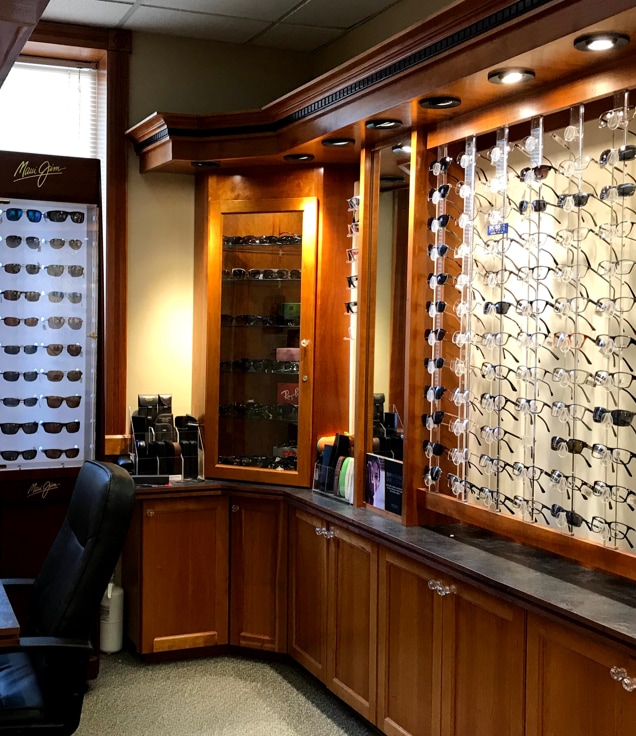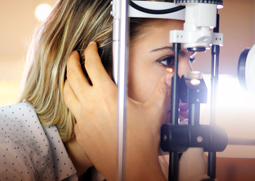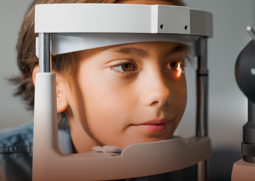Comprehensive Eye Exams from Our Family to Yours
No matter your age or health, regular eye exams are an essential part of preventive health care. We not only determine your vision prescription, but we also check how your eyes are functioning and look for vision problems and ocular disease. A comprehensive eye exam can also uncover other health issues, like diabetes, high blood pressure, and cancer.
From infancy into adulthood, our eyes are continually changing as we grow. They need different levels of care, depending on several factors. Children have different eye health risks than middle-aged adults, who, in turn, have different risks than seniors.
A comprehensive eye exam will help us catch eye issues from strabismus to glaucoma before they can progress and allow us to diagnose and treat them before they lead to vision problems.
How Often Do You Need an Eye Exam?
How often you need an eye exam depends on your age, health concerns, risk factors, and personal eye care needs. We follow the frequency schedule suggested by the Canadian Association of Optometrists (CAO), but we may suggest an alternative schedule for you or your loved one, depending on your needs:
- Infants and toddlers should receive their first eye exam between 6 and 9 months of age.
- Preschool children between the ages of 2 and 5 undergo at least one eye exam before starting school.
- School-aged children between the ages of 6 and 19 should have an eye exam every year.
- Adults between 20 and 39 should have an eye exam every 2 to 3 years.
- Adults between the ages of 40 and 64 should have an eye exam about every 2 years.
- Adults over 65 should undergo annual eye exams to monitor the eyes for age-related risks and vision changes common at this stage of life.
The Eye Exam Process
Eye exams are essential for the early detection and diagnosis of eye disease. Because so many eye diseases have no noticeable early symptoms, eye exams are the best way to protect you from potential vision loss.
Our exam process includes:
- A discussion about your vision history, current or past vision problems, a detailed family history, and health conditions. Some eye diseases have a genetic component.
- A thorough analysis of your visual needs at home, work, and leisure. Different tasks may require different eyewear.
- A visual acuity test for both of your eyes and refraction assessment to determine your current prescription.
- An assessment of your binocular vision.
- An evaluation of your internal and external eye health, using retinal imaging and glaucoma testing.
- An assessment of the neurological visual system, pupillary reaction, eye muscle movement, and peripheral vision.
Diabetic Eye Exams
Diabetes is a disease that impacts the body’s ability to produce or use insulin. It is also the single leading cause of blindness in Canada.
Our eyes are fragile machines that are fed by many delicate blood vessels. When the body cannot remove sugar from the bloodstream, as in what occurs in those with diabetes, these sugars can build up and eventually damage the vessels in your eyes.
This damage leads to diabetic retinopathy and diabetic macular edema, eye diseases that can lead to irreversible vision loss if not caught and treated early.
If you have diabetes, you should undergo annual eye exams to monitor for signs of diabetic eye diseases. Proper management of your disease, seeing your general practitioner for regular appointments, following your physician’s recommendations, and your ABCDEs are crucial to protecting your health when it comes to diabetes.
Where to Find Us
You can find us on St. Andrew Street West nestled in Fergus’s historic downtown. Our office has a small step at the front door, but we are happy to assist our patients who use assistive mobility devices to enter our office safely.
Free parking is available on St. Andrew Street West (3 hours), as well as in the parking lot behind our office, as well as in the municipal lot at Provost Lane and St. Patrick Street.

Our Address
144 St. Andrew Street WestFergus, ON N1M 1N5
Contact Information
- Phone: (519) 843-2660
- Fax: (519) 843-7072


















